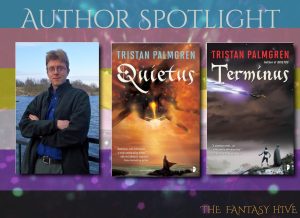Interview with Tristan Palmgren (QUIETUS)
I’m a science fiction and fantasy novelist, writing both original SF&F and Marvel books. My first novel, QUIETUS, was published in 2018. Its sequel, TERMINUS, came out later that same year.
I’ve also been writing a whole bunch of novels for Marvel. DOMINO: STRAYS and OUTLAW: RELENTLESS came out in September of 2020 and 2021, respectively. My most recent book, THE SIEGE OF X-41, an undersea horror X-Men novel, came out just this May. And my next, the affectionate parody SQUIRREL GIRL UNIVERSE, is coming out this August.
Yes, that is only four months after my last book… and less than a year from the novel before that one. Three novels in the span of eleven months. I’ve been busy!
Finally, I am nonbinary and agender. I prefer to go by they/them.
Social media links:
I’m on Twitter at @tristanpalmgren. For many reasons, I’m presently limiting my Twitter presence to book and writing matters. Find me more socially on Mastodon at @tristanpalmgren@wandering.shop. You can also contact me via my website, tristanpalmgren.com. Now I’ve said my name so many times it no longer sounds real to me.
Welcome to the Hive, Tristan. Let’s start with the basics: tell us about your books – why should readers check out your work?
Quietus is about a transdimensional anthropologist studying our world during the Black Death, and the Carthusian monk she can’t help but save. If the phrase “transdimensional anthropologist” strikes any kind of chord in your imagination, this book is for you.
Are you looking to find reasons for hope for a cynical, pessimistic, short-sighted civilization? My worlds tend to be unflinching in their darkness, but somehow my characters keep finding reasons to go on. Good reasons, too.
Focusing on Quietus, can you tell us a bit more about your characters? How did you approach writing a Florentine Carthusian monk experiencing technology for the first time?
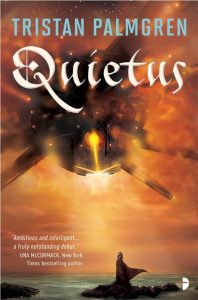 Habidah and her team are trying desperately to keep their emotional distance from the peoples they study. Habidah can’t afford distractions. Her quest is both personal and urgent. Her civilization is suffering from its own advanced plague. Habidah hasn’t come to look for a cure. She’s come to understand how cultures survive. It’s been so long since her civilization has had to face a virulent, lethal pandemic that they need to remember how.
Habidah and her team are trying desperately to keep their emotional distance from the peoples they study. Habidah can’t afford distractions. Her quest is both personal and urgent. Her civilization is suffering from its own advanced plague. Habidah hasn’t come to look for a cure. She’s come to understand how cultures survive. It’s been so long since her civilization has had to face a virulent, lethal pandemic that they need to remember how.
Niccolucio, a young, Florentine Carthusian monk, is the last survivor of an isolated monastery. All of his brothers are dead, and the lay community devastated. He’s cast out into the wilderness, ordained for a short life of grief and suffering. Until a miracle intervenes.
(I swear I did not intend this book to be so on-topic for the 2020s. It predates the COVID-19 pandemic.)
On Niccolucio and technology: it’s difficult to answer without some spoilers for the early chapters of Quietus, so please skip the next few paragraphs if that’s an issue for you.
When Habidah rescues Niccolucio, the methods don’t interest him as much as the meaning.
I played down Niccolucio’s reactions to Habidah’s future-world tech for several reasons, in-story and out-of-story. That just wasn’t what the story was about. Quietus is a fish-out-of-water story… but Habidah is the fish, not Niccolucio. This is his world, and Habidah isn’t here to change it. Spending a lot of time with Niccolucio gawking wouldn’t have been dramatically compelling.
But that also felt right for Niccolucio. He’s also been separated from secular life for quite some time. Niccolucio lives in a world of miracles both horrific and beatific. But mostly horrific. He’s lost, his faith is broken, and his world is dying around him. Then Habidah finds him, and can’t stop herself from saving him. He’s not as interested in the artifacts she uses to do it as he is in her, and her reasons for acting.
You raise that interesting moral question in the actions of Habidah rescuing Niccoluccio of interfering with the natural course of events. What are your thoughts on this?
So Quietus has the vibe of a time travel novel, there’s no actual time travel taking place. Habidah and her colleagues aren’t from the future. The advanced civilization they’re from exists in another plane, another dimension. They have no grandfather paradoxes to fuss over. And the worlds that they come from don’t see non-interference as a virtue.
They’ve arrived to study how this world responds to a civilization-shattering mass death event. They avoid interfering for academic reasons, not ethical ones. They don’t want to bias their observations. It’s when Habidah starts to think that she has a moral obligation to intervene that her reasoning starts to crumble.
Let’s talk about the writing process; do you have a process? Tell us a little something about how your story comes together.
Sometimes the story requires research, and sometimes the research requires a story.
One of my joys in life is being an aimless reader. Assignment reading and obligation reading has its place, but picking interesting-looking books off the shelf and diving into them without a purpose is productive for me, too. I’d started reading about the Black Death and about monastic life long before I knew I was going to be writing a story about them.
The characters started with the context, which has (generally) worked better for me than starting with the character and doing the research afterward. By the time Quietus started coming together, my imagination was already full of medieval monastic life and the horrors of the bubonic plague done.
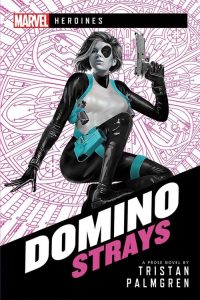
You’ve written a number of titles in Aconyte’s Marvel series. How does it compare working in an already established universe, to one of your own creation?
Working for Marvel has been a blast, and it feels less different than writing for myself than I expected. I mentioned earlier that Quietus formed research-first. Same goes for Marvel. I dove into the universe and immersed myself in the characters first, and generated stories around what I’d learned and about what had most interested me. Research is fun (especially when it means reading lots of comics!).
Research is also about respect: respecting your audience, respecting the people who lived (or are living) through these experiences, and respecting the writers and the fans of the characters and universes you’re picking up.
The best thing about writing for Marvel is stretching my voice in ways that I never would have otherwise. Marvel stories can be very different in tone. My first book for them (Domino: Strays) was a gritty, low-powered story about childhood and abuse. My most recent (Squirrel Girl Universe, out this August) is an optimistic, affectionate parody of both space opera and the Marvel universe at large. Neither of those tones were ones that, left to my own devices, I would have tried anytime soon. And I’m a stronger writer for spending the time to develop them.
We see such varying opinions from authors when it comes to the time of editing their books. How have you found the editing process? Enjoyable, stressful or satisfying?
Editing is less stressful for me than drafting, both when I’m working with my own edits and with my editors. I’ve been blessed with some fantastic editors, both at Angry Robot Books and Aconyte Books.
Writing a book is a marathon. Pacing is important. Finishing a draft and going into editing mode, and then back into drafting, is a relaxing rhythm. Writing would be less bearable if all I ever did was write rough drafts. It would be exhausting. Switching up the task is welcome.
What (or who) are your most significant fantasy/sci-fi influences? Are there any creators whom you dream of working with someday?
For science fiction and fantasy: I’ve devoured everything Iain M. Banks has written. I mentioned earlier that I tend to write dark worlds with characters who nonetheless trend toward optimism. Banks’s worlds can be astonishingly dark, but at the same time it’s hard to describe the Culture in his series of the same name as anything other than a Utopia. Those two things clashing together is the feeling I’m chasing every day in my writing.
For Marvel: Gail Simone and Ryan North are delightful comics writers, and snappy and funny in very different ways. I’ve had far too much fun writing characters they’ve either created or shepherded. A collaboration would be a dream come to life.
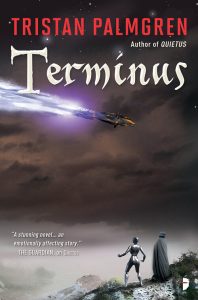 The world shifts, and you find yourself with an extra day on your hands during which you’re not allowed to write. How do you choose to spend the day?
The world shifts, and you find yourself with an extra day on your hands during which you’re not allowed to write. How do you choose to spend the day?
I write most days, but I’m not a believer of the write-every-single-day model. Some days, like when I’m sick or traveling, I don’t have the energy to produce good work. I’ll also take breaks and mini-vacations for reaching milestones like finishing a rough draft. As much as I appreciate editing as a change of pace, editing a draft the day after finishing it feels exactly as comfortable as wearing a coat of weasels, and something you’ll only catch me doing when I have an urgent deadline. (Editing without a break for breath, I mean, not wearing the coat of weasels.)
So I’d probably spend that day like my other vacation-from-writing days: working the dayjob, reading, and playing games.
One of our favourite questions here on the Fantasy Hive: which fantastical creature would you ride into battle and why?
Unicorn! They come with their own pointy bits, and sometimes magic.
Tell us about a book you love. Any hidden gems?
I’ve been ingesting more nonfiction as part of my balanced reading diet, and that’s led to stories I had no idea I wanted to tell. I’ve read all of Barbara Tuchman’s books I’ve been able to find. She’s a novelist’s historian, with a genius gift for narrative. Both Sean Carroll and Anil Ananthaswamy’s science writing blasted my brain to tiny little bits. I’m still finding fragments of my head stuck in the carpet.
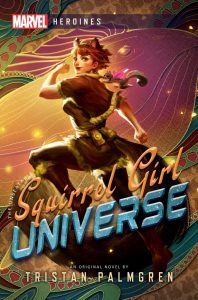 Can you tell us a little something about your current work(s) in progress? Have you any upcoming projects which you can share?
Can you tell us a little something about your current work(s) in progress? Have you any upcoming projects which you can share?
Squirrel Girl Universe is coming out later this summer. Paper supply issues may complicate this, but look for it on shelves in the US in August, and UK shortly thereafter. E-Book versions will be available in both places in August. I also have an independent space opera novel I’ve been hammering on between Marvel drafts.
There may or may not be other things in the works that I’m not allowed to mention! Who could say? Certainly not me.
Finally, what is the one thing you hope readers take away from your writing?
That there are reasons to keep going.
That’s a beautiful message Tristan.
Thank you so much for joining us today!
Thank you for having me!
You can find Tristan’s novels at:
